Sustainability ENEG20003: Reflective Report on Solid Waste Issues
VerifiedAdded on 2023/06/10
|7
|2004
|390
Report
AI Summary
This report provides a comprehensive overview of solid waste management, addressing its definition, sources, and the environmental and health problems associated with inadequate disposal. It highlights the importance of effective waste management techniques and discusses the roles and require...

Sustainable studio
Reflective paper 1
Reflective paper 1
Paraphrase This Document
Need a fresh take? Get an instant paraphrase of this document with our AI Paraphraser
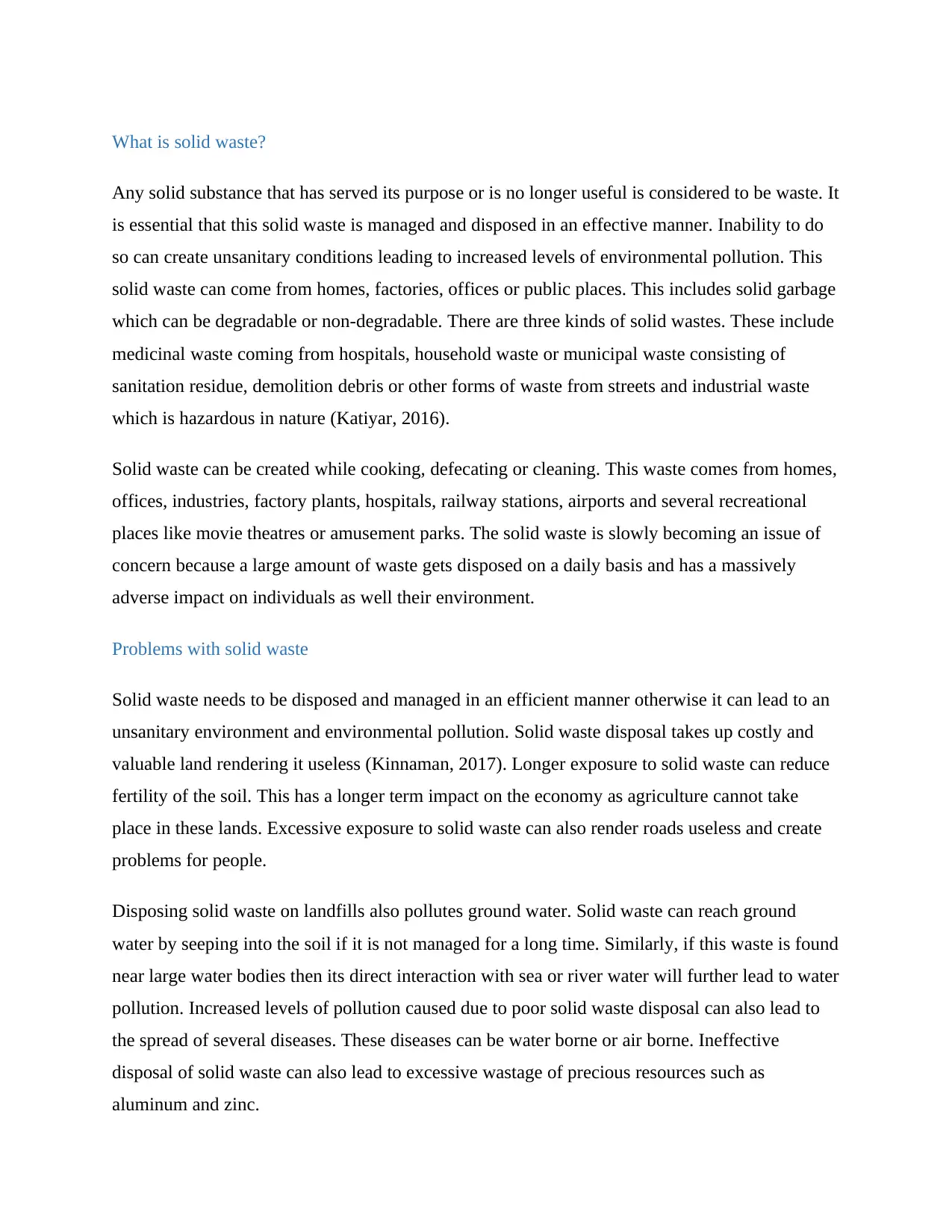
What is solid waste?
Any solid substance that has served its purpose or is no longer useful is considered to be waste. It
is essential that this solid waste is managed and disposed in an effective manner. Inability to do
so can create unsanitary conditions leading to increased levels of environmental pollution. This
solid waste can come from homes, factories, offices or public places. This includes solid garbage
which can be degradable or non-degradable. There are three kinds of solid wastes. These include
medicinal waste coming from hospitals, household waste or municipal waste consisting of
sanitation residue, demolition debris or other forms of waste from streets and industrial waste
which is hazardous in nature (Katiyar, 2016).
Solid waste can be created while cooking, defecating or cleaning. This waste comes from homes,
offices, industries, factory plants, hospitals, railway stations, airports and several recreational
places like movie theatres or amusement parks. The solid waste is slowly becoming an issue of
concern because a large amount of waste gets disposed on a daily basis and has a massively
adverse impact on individuals as well their environment.
Problems with solid waste
Solid waste needs to be disposed and managed in an efficient manner otherwise it can lead to an
unsanitary environment and environmental pollution. Solid waste disposal takes up costly and
valuable land rendering it useless (Kinnaman, 2017). Longer exposure to solid waste can reduce
fertility of the soil. This has a longer term impact on the economy as agriculture cannot take
place in these lands. Excessive exposure to solid waste can also render roads useless and create
problems for people.
Disposing solid waste on landfills also pollutes ground water. Solid waste can reach ground
water by seeping into the soil if it is not managed for a long time. Similarly, if this waste is found
near large water bodies then its direct interaction with sea or river water will further lead to water
pollution. Increased levels of pollution caused due to poor solid waste disposal can also lead to
the spread of several diseases. These diseases can be water borne or air borne. Ineffective
disposal of solid waste can also lead to excessive wastage of precious resources such as
aluminum and zinc.
Any solid substance that has served its purpose or is no longer useful is considered to be waste. It
is essential that this solid waste is managed and disposed in an effective manner. Inability to do
so can create unsanitary conditions leading to increased levels of environmental pollution. This
solid waste can come from homes, factories, offices or public places. This includes solid garbage
which can be degradable or non-degradable. There are three kinds of solid wastes. These include
medicinal waste coming from hospitals, household waste or municipal waste consisting of
sanitation residue, demolition debris or other forms of waste from streets and industrial waste
which is hazardous in nature (Katiyar, 2016).
Solid waste can be created while cooking, defecating or cleaning. This waste comes from homes,
offices, industries, factory plants, hospitals, railway stations, airports and several recreational
places like movie theatres or amusement parks. The solid waste is slowly becoming an issue of
concern because a large amount of waste gets disposed on a daily basis and has a massively
adverse impact on individuals as well their environment.
Problems with solid waste
Solid waste needs to be disposed and managed in an efficient manner otherwise it can lead to an
unsanitary environment and environmental pollution. Solid waste disposal takes up costly and
valuable land rendering it useless (Kinnaman, 2017). Longer exposure to solid waste can reduce
fertility of the soil. This has a longer term impact on the economy as agriculture cannot take
place in these lands. Excessive exposure to solid waste can also render roads useless and create
problems for people.
Disposing solid waste on landfills also pollutes ground water. Solid waste can reach ground
water by seeping into the soil if it is not managed for a long time. Similarly, if this waste is found
near large water bodies then its direct interaction with sea or river water will further lead to water
pollution. Increased levels of pollution caused due to poor solid waste disposal can also lead to
the spread of several diseases. These diseases can be water borne or air borne. Ineffective
disposal of solid waste can also lead to excessive wastage of precious resources such as
aluminum and zinc.
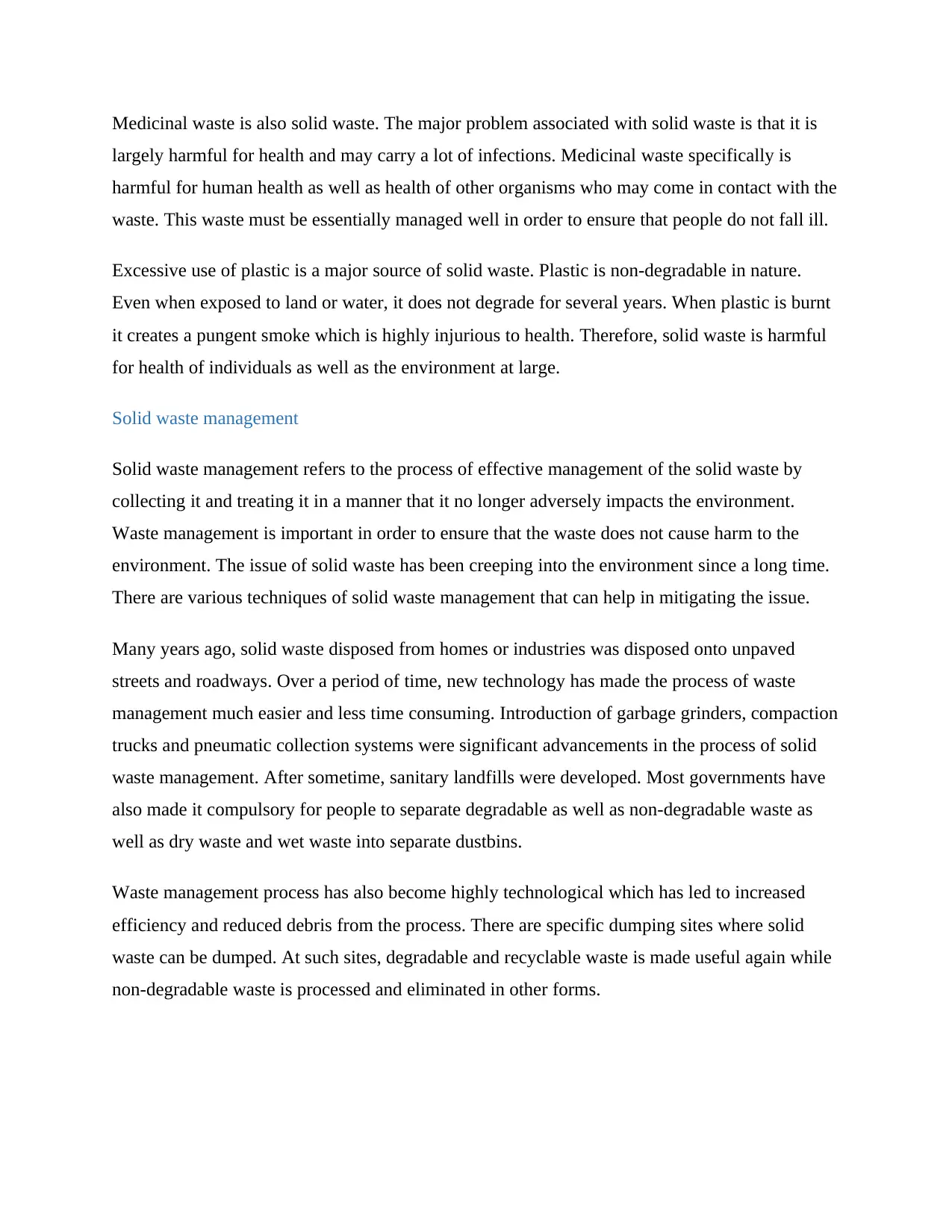
Medicinal waste is also solid waste. The major problem associated with solid waste is that it is
largely harmful for health and may carry a lot of infections. Medicinal waste specifically is
harmful for human health as well as health of other organisms who may come in contact with the
waste. This waste must be essentially managed well in order to ensure that people do not fall ill.
Excessive use of plastic is a major source of solid waste. Plastic is non-degradable in nature.
Even when exposed to land or water, it does not degrade for several years. When plastic is burnt
it creates a pungent smoke which is highly injurious to health. Therefore, solid waste is harmful
for health of individuals as well as the environment at large.
Solid waste management
Solid waste management refers to the process of effective management of the solid waste by
collecting it and treating it in a manner that it no longer adversely impacts the environment.
Waste management is important in order to ensure that the waste does not cause harm to the
environment. The issue of solid waste has been creeping into the environment since a long time.
There are various techniques of solid waste management that can help in mitigating the issue.
Many years ago, solid waste disposed from homes or industries was disposed onto unpaved
streets and roadways. Over a period of time, new technology has made the process of waste
management much easier and less time consuming. Introduction of garbage grinders, compaction
trucks and pneumatic collection systems were significant advancements in the process of solid
waste management. After sometime, sanitary landfills were developed. Most governments have
also made it compulsory for people to separate degradable as well as non-degradable waste as
well as dry waste and wet waste into separate dustbins.
Waste management process has also become highly technological which has led to increased
efficiency and reduced debris from the process. There are specific dumping sites where solid
waste can be dumped. At such sites, degradable and recyclable waste is made useful again while
non-degradable waste is processed and eliminated in other forms.
largely harmful for health and may carry a lot of infections. Medicinal waste specifically is
harmful for human health as well as health of other organisms who may come in contact with the
waste. This waste must be essentially managed well in order to ensure that people do not fall ill.
Excessive use of plastic is a major source of solid waste. Plastic is non-degradable in nature.
Even when exposed to land or water, it does not degrade for several years. When plastic is burnt
it creates a pungent smoke which is highly injurious to health. Therefore, solid waste is harmful
for health of individuals as well as the environment at large.
Solid waste management
Solid waste management refers to the process of effective management of the solid waste by
collecting it and treating it in a manner that it no longer adversely impacts the environment.
Waste management is important in order to ensure that the waste does not cause harm to the
environment. The issue of solid waste has been creeping into the environment since a long time.
There are various techniques of solid waste management that can help in mitigating the issue.
Many years ago, solid waste disposed from homes or industries was disposed onto unpaved
streets and roadways. Over a period of time, new technology has made the process of waste
management much easier and less time consuming. Introduction of garbage grinders, compaction
trucks and pneumatic collection systems were significant advancements in the process of solid
waste management. After sometime, sanitary landfills were developed. Most governments have
also made it compulsory for people to separate degradable as well as non-degradable waste as
well as dry waste and wet waste into separate dustbins.
Waste management process has also become highly technological which has led to increased
efficiency and reduced debris from the process. There are specific dumping sites where solid
waste can be dumped. At such sites, degradable and recyclable waste is made useful again while
non-degradable waste is processed and eliminated in other forms.
⊘ This is a preview!⊘
Do you want full access?
Subscribe today to unlock all pages.

Trusted by 1+ million students worldwide
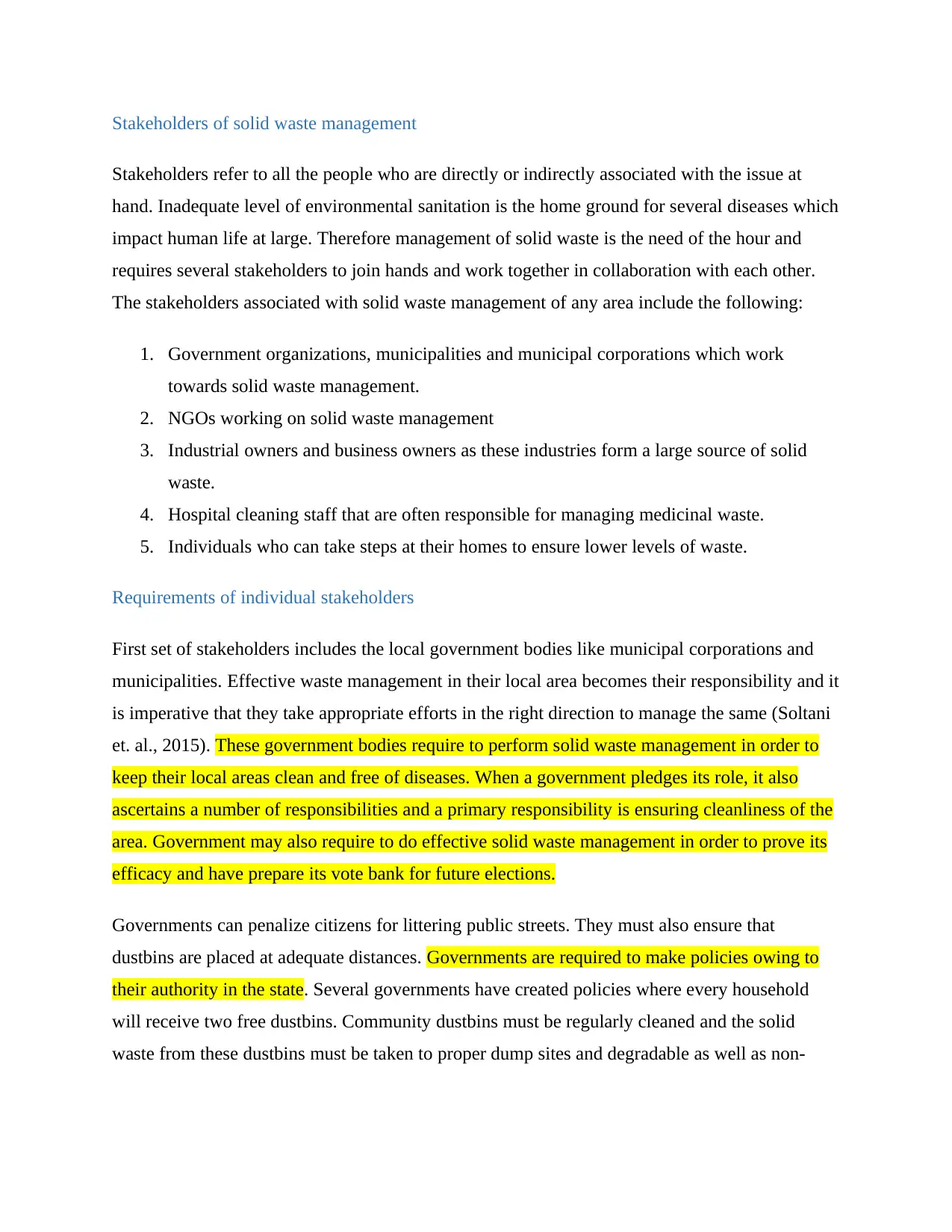
Stakeholders of solid waste management
Stakeholders refer to all the people who are directly or indirectly associated with the issue at
hand. Inadequate level of environmental sanitation is the home ground for several diseases which
impact human life at large. Therefore management of solid waste is the need of the hour and
requires several stakeholders to join hands and work together in collaboration with each other.
The stakeholders associated with solid waste management of any area include the following:
1. Government organizations, municipalities and municipal corporations which work
towards solid waste management.
2. NGOs working on solid waste management
3. Industrial owners and business owners as these industries form a large source of solid
waste.
4. Hospital cleaning staff that are often responsible for managing medicinal waste.
5. Individuals who can take steps at their homes to ensure lower levels of waste.
Requirements of individual stakeholders
First set of stakeholders includes the local government bodies like municipal corporations and
municipalities. Effective waste management in their local area becomes their responsibility and it
is imperative that they take appropriate efforts in the right direction to manage the same (Soltani
et. al., 2015). These government bodies require to perform solid waste management in order to
keep their local areas clean and free of diseases. When a government pledges its role, it also
ascertains a number of responsibilities and a primary responsibility is ensuring cleanliness of the
area. Government may also require to do effective solid waste management in order to prove its
efficacy and have prepare its vote bank for future elections.
Governments can penalize citizens for littering public streets. They must also ensure that
dustbins are placed at adequate distances. Governments are required to make policies owing to
their authority in the state. Several governments have created policies where every household
will receive two free dustbins. Community dustbins must be regularly cleaned and the solid
waste from these dustbins must be taken to proper dump sites and degradable as well as non-
Stakeholders refer to all the people who are directly or indirectly associated with the issue at
hand. Inadequate level of environmental sanitation is the home ground for several diseases which
impact human life at large. Therefore management of solid waste is the need of the hour and
requires several stakeholders to join hands and work together in collaboration with each other.
The stakeholders associated with solid waste management of any area include the following:
1. Government organizations, municipalities and municipal corporations which work
towards solid waste management.
2. NGOs working on solid waste management
3. Industrial owners and business owners as these industries form a large source of solid
waste.
4. Hospital cleaning staff that are often responsible for managing medicinal waste.
5. Individuals who can take steps at their homes to ensure lower levels of waste.
Requirements of individual stakeholders
First set of stakeholders includes the local government bodies like municipal corporations and
municipalities. Effective waste management in their local area becomes their responsibility and it
is imperative that they take appropriate efforts in the right direction to manage the same (Soltani
et. al., 2015). These government bodies require to perform solid waste management in order to
keep their local areas clean and free of diseases. When a government pledges its role, it also
ascertains a number of responsibilities and a primary responsibility is ensuring cleanliness of the
area. Government may also require to do effective solid waste management in order to prove its
efficacy and have prepare its vote bank for future elections.
Governments can penalize citizens for littering public streets. They must also ensure that
dustbins are placed at adequate distances. Governments are required to make policies owing to
their authority in the state. Several governments have created policies where every household
will receive two free dustbins. Community dustbins must be regularly cleaned and the solid
waste from these dustbins must be taken to proper dump sites and degradable as well as non-
Paraphrase This Document
Need a fresh take? Get an instant paraphrase of this document with our AI Paraphraser
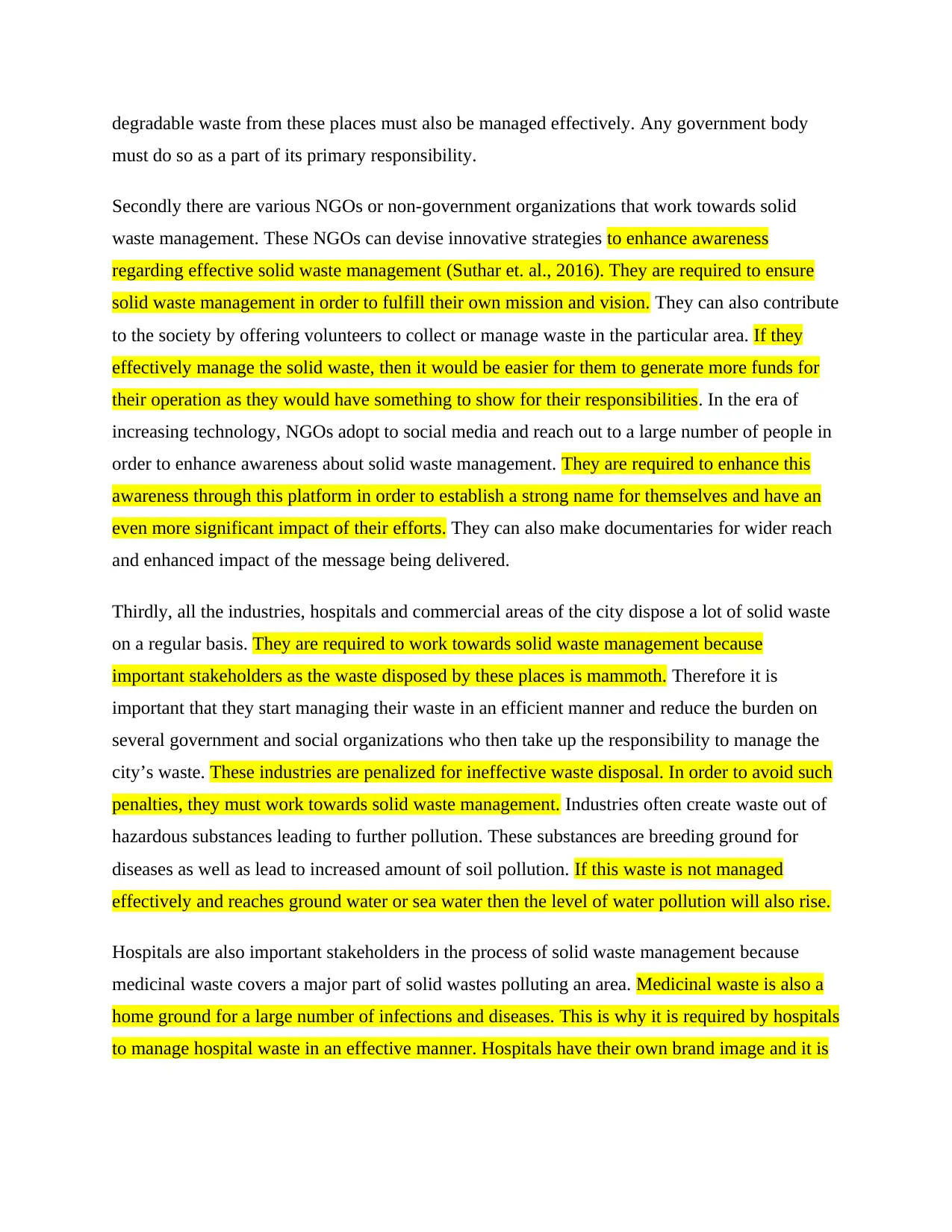
degradable waste from these places must also be managed effectively. Any government body
must do so as a part of its primary responsibility.
Secondly there are various NGOs or non-government organizations that work towards solid
waste management. These NGOs can devise innovative strategies to enhance awareness
regarding effective solid waste management (Suthar et. al., 2016). They are required to ensure
solid waste management in order to fulfill their own mission and vision. They can also contribute
to the society by offering volunteers to collect or manage waste in the particular area. If they
effectively manage the solid waste, then it would be easier for them to generate more funds for
their operation as they would have something to show for their responsibilities. In the era of
increasing technology, NGOs adopt to social media and reach out to a large number of people in
order to enhance awareness about solid waste management. They are required to enhance this
awareness through this platform in order to establish a strong name for themselves and have an
even more significant impact of their efforts. They can also make documentaries for wider reach
and enhanced impact of the message being delivered.
Thirdly, all the industries, hospitals and commercial areas of the city dispose a lot of solid waste
on a regular basis. They are required to work towards solid waste management because
important stakeholders as the waste disposed by these places is mammoth. Therefore it is
important that they start managing their waste in an efficient manner and reduce the burden on
several government and social organizations who then take up the responsibility to manage the
city’s waste. These industries are penalized for ineffective waste disposal. In order to avoid such
penalties, they must work towards solid waste management. Industries often create waste out of
hazardous substances leading to further pollution. These substances are breeding ground for
diseases as well as lead to increased amount of soil pollution. If this waste is not managed
effectively and reaches ground water or sea water then the level of water pollution will also rise.
Hospitals are also important stakeholders in the process of solid waste management because
medicinal waste covers a major part of solid wastes polluting an area. Medicinal waste is also a
home ground for a large number of infections and diseases. This is why it is required by hospitals
to manage hospital waste in an effective manner. Hospitals have their own brand image and it is
must do so as a part of its primary responsibility.
Secondly there are various NGOs or non-government organizations that work towards solid
waste management. These NGOs can devise innovative strategies to enhance awareness
regarding effective solid waste management (Suthar et. al., 2016). They are required to ensure
solid waste management in order to fulfill their own mission and vision. They can also contribute
to the society by offering volunteers to collect or manage waste in the particular area. If they
effectively manage the solid waste, then it would be easier for them to generate more funds for
their operation as they would have something to show for their responsibilities. In the era of
increasing technology, NGOs adopt to social media and reach out to a large number of people in
order to enhance awareness about solid waste management. They are required to enhance this
awareness through this platform in order to establish a strong name for themselves and have an
even more significant impact of their efforts. They can also make documentaries for wider reach
and enhanced impact of the message being delivered.
Thirdly, all the industries, hospitals and commercial areas of the city dispose a lot of solid waste
on a regular basis. They are required to work towards solid waste management because
important stakeholders as the waste disposed by these places is mammoth. Therefore it is
important that they start managing their waste in an efficient manner and reduce the burden on
several government and social organizations who then take up the responsibility to manage the
city’s waste. These industries are penalized for ineffective waste disposal. In order to avoid such
penalties, they must work towards solid waste management. Industries often create waste out of
hazardous substances leading to further pollution. These substances are breeding ground for
diseases as well as lead to increased amount of soil pollution. If this waste is not managed
effectively and reaches ground water or sea water then the level of water pollution will also rise.
Hospitals are also important stakeholders in the process of solid waste management because
medicinal waste covers a major part of solid wastes polluting an area. Medicinal waste is also a
home ground for a large number of infections and diseases. This is why it is required by hospitals
to manage hospital waste in an effective manner. Hospitals have their own brand image and it is
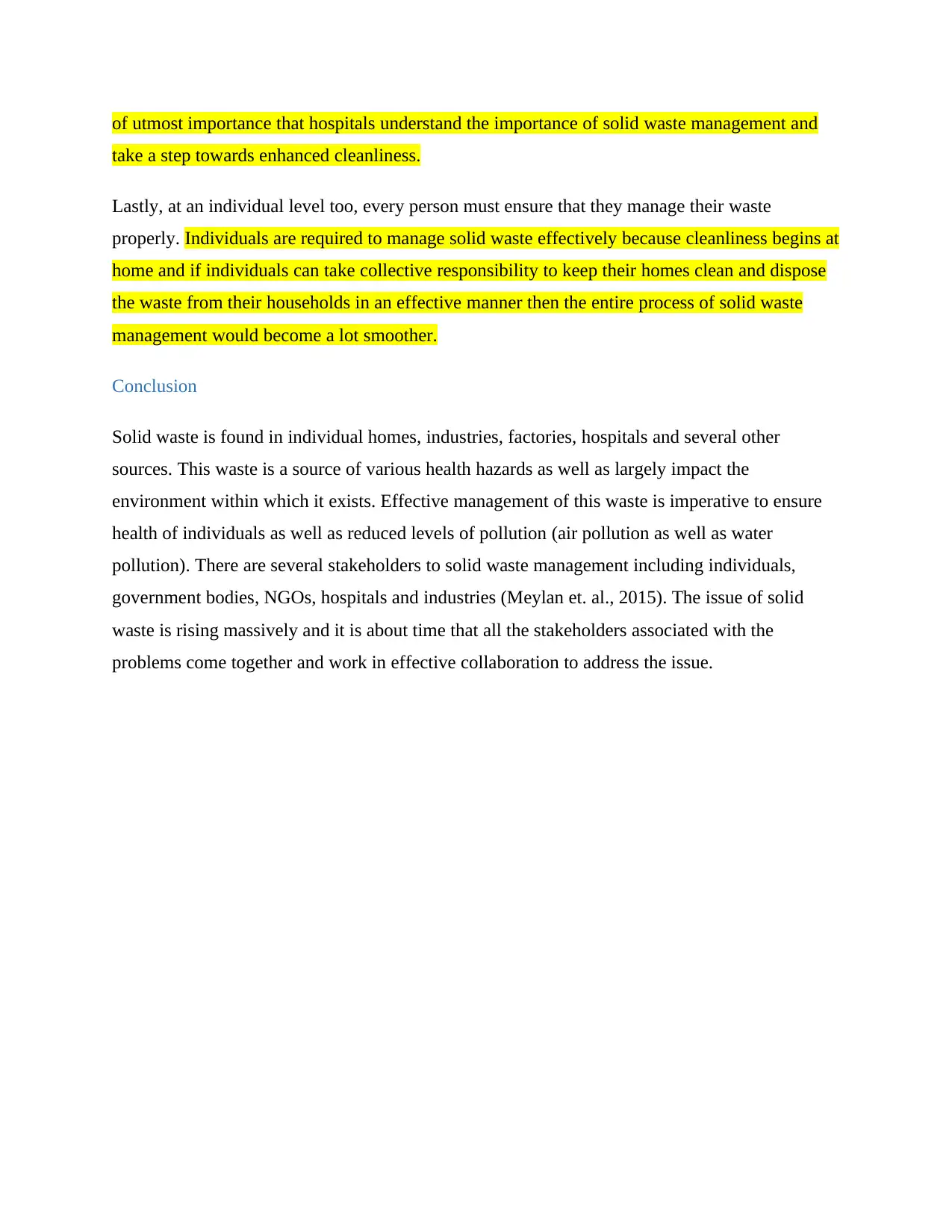
of utmost importance that hospitals understand the importance of solid waste management and
take a step towards enhanced cleanliness.
Lastly, at an individual level too, every person must ensure that they manage their waste
properly. Individuals are required to manage solid waste effectively because cleanliness begins at
home and if individuals can take collective responsibility to keep their homes clean and dispose
the waste from their households in an effective manner then the entire process of solid waste
management would become a lot smoother.
Conclusion
Solid waste is found in individual homes, industries, factories, hospitals and several other
sources. This waste is a source of various health hazards as well as largely impact the
environment within which it exists. Effective management of this waste is imperative to ensure
health of individuals as well as reduced levels of pollution (air pollution as well as water
pollution). There are several stakeholders to solid waste management including individuals,
government bodies, NGOs, hospitals and industries (Meylan et. al., 2015). The issue of solid
waste is rising massively and it is about time that all the stakeholders associated with the
problems come together and work in effective collaboration to address the issue.
take a step towards enhanced cleanliness.
Lastly, at an individual level too, every person must ensure that they manage their waste
properly. Individuals are required to manage solid waste effectively because cleanliness begins at
home and if individuals can take collective responsibility to keep their homes clean and dispose
the waste from their households in an effective manner then the entire process of solid waste
management would become a lot smoother.
Conclusion
Solid waste is found in individual homes, industries, factories, hospitals and several other
sources. This waste is a source of various health hazards as well as largely impact the
environment within which it exists. Effective management of this waste is imperative to ensure
health of individuals as well as reduced levels of pollution (air pollution as well as water
pollution). There are several stakeholders to solid waste management including individuals,
government bodies, NGOs, hospitals and industries (Meylan et. al., 2015). The issue of solid
waste is rising massively and it is about time that all the stakeholders associated with the
problems come together and work in effective collaboration to address the issue.
⊘ This is a preview!⊘
Do you want full access?
Subscribe today to unlock all pages.

Trusted by 1+ million students worldwide
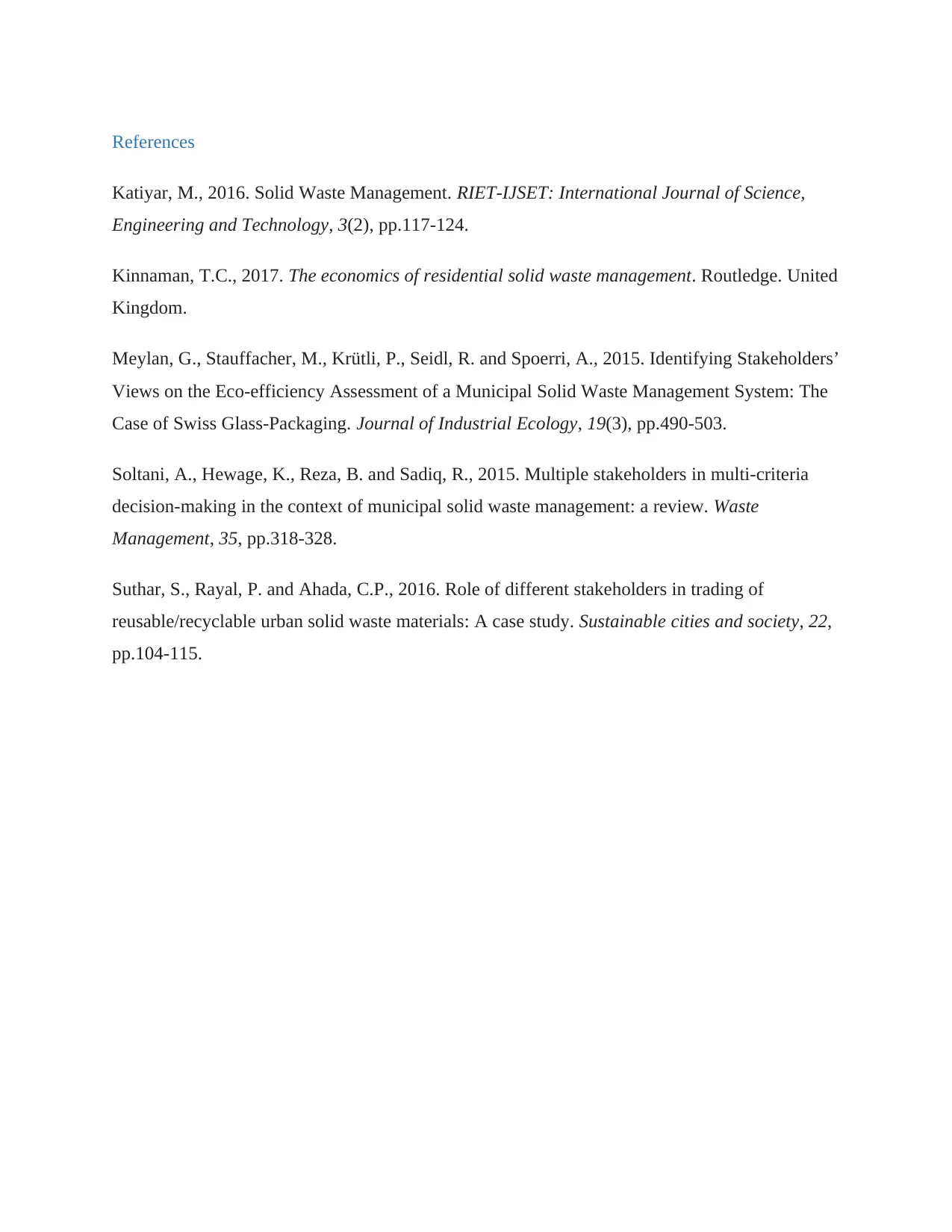
References
Katiyar, M., 2016. Solid Waste Management. RIET-IJSET: International Journal of Science,
Engineering and Technology, 3(2), pp.117-124.
Kinnaman, T.C., 2017. The economics of residential solid waste management. Routledge. United
Kingdom.
Meylan, G., Stauffacher, M., Krütli, P., Seidl, R. and Spoerri, A., 2015. Identifying Stakeholders’
Views on the Eco‐efficiency Assessment of a Municipal Solid Waste Management System: The
Case of Swiss Glass‐Packaging. Journal of Industrial Ecology, 19(3), pp.490-503.
Soltani, A., Hewage, K., Reza, B. and Sadiq, R., 2015. Multiple stakeholders in multi-criteria
decision-making in the context of municipal solid waste management: a review. Waste
Management, 35, pp.318-328.
Suthar, S., Rayal, P. and Ahada, C.P., 2016. Role of different stakeholders in trading of
reusable/recyclable urban solid waste materials: A case study. Sustainable cities and society, 22,
pp.104-115.
Katiyar, M., 2016. Solid Waste Management. RIET-IJSET: International Journal of Science,
Engineering and Technology, 3(2), pp.117-124.
Kinnaman, T.C., 2017. The economics of residential solid waste management. Routledge. United
Kingdom.
Meylan, G., Stauffacher, M., Krütli, P., Seidl, R. and Spoerri, A., 2015. Identifying Stakeholders’
Views on the Eco‐efficiency Assessment of a Municipal Solid Waste Management System: The
Case of Swiss Glass‐Packaging. Journal of Industrial Ecology, 19(3), pp.490-503.
Soltani, A., Hewage, K., Reza, B. and Sadiq, R., 2015. Multiple stakeholders in multi-criteria
decision-making in the context of municipal solid waste management: a review. Waste
Management, 35, pp.318-328.
Suthar, S., Rayal, P. and Ahada, C.P., 2016. Role of different stakeholders in trading of
reusable/recyclable urban solid waste materials: A case study. Sustainable cities and society, 22,
pp.104-115.
1 out of 7
Related Documents
Your All-in-One AI-Powered Toolkit for Academic Success.
+13062052269
info@desklib.com
Available 24*7 on WhatsApp / Email
![[object Object]](/_next/static/media/star-bottom.7253800d.svg)
Unlock your academic potential
© 2024 | Zucol Services PVT LTD | All rights reserved.




